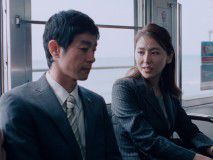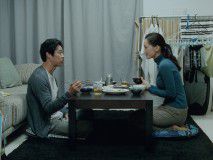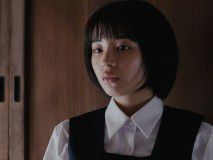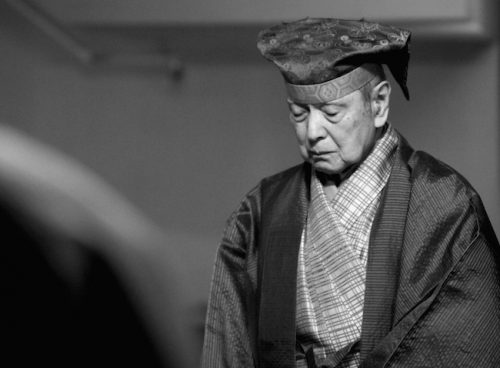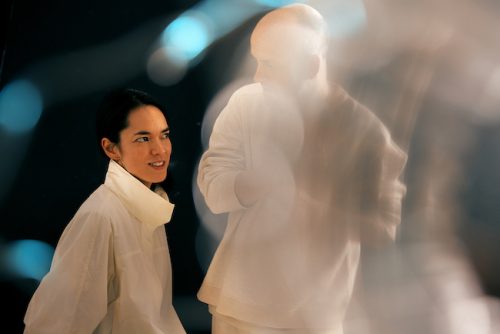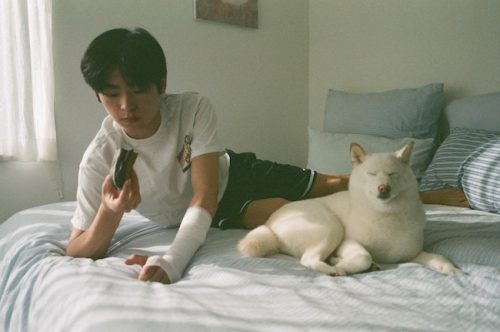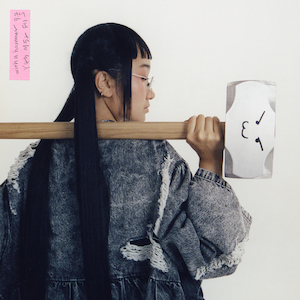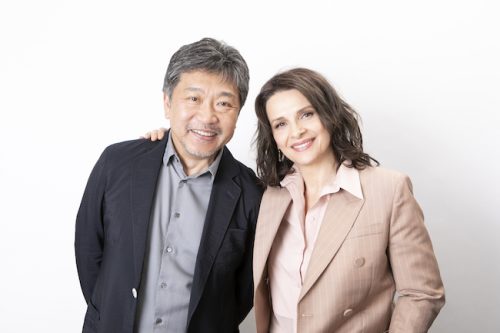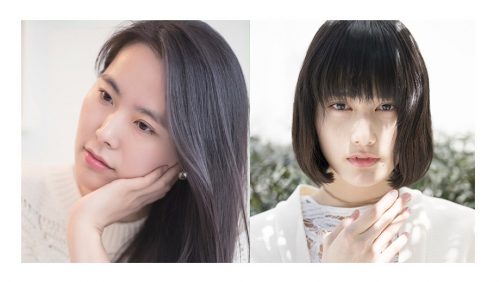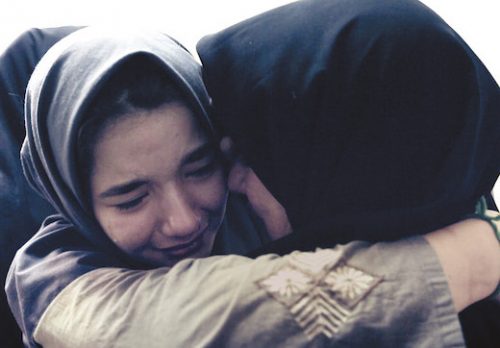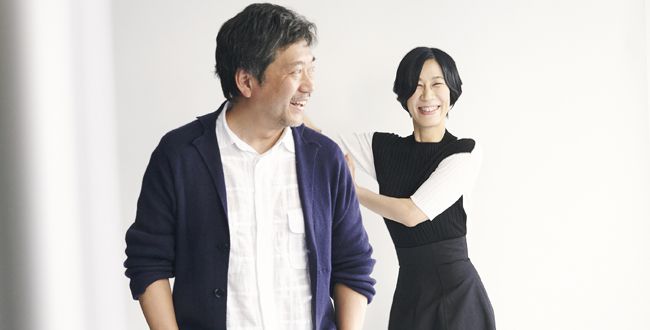
──具体的な作業は、映像を観ながら進めるんですか?
菅野「それが私、目があんまりよくなくて。映像そのものは、実はあまり観てなかったりするんですよ。今回もそう」
──え、そうなんですか? 意外です。
菅野「あら、どうして?」
──映像と音楽のシンクロ具合やここで音楽を入れるというタイミングなどが素晴らしかったので。
菅野「もちろん、そのつど確認はしているんですよ。ただ、スクリーンの前にしっかり座ったり、モニタに張り付いて作業するとかは、基本ない。せいぜい小っちゃいサムネイルで確認するくらいです。極端な話、何となく状況だけ分かればいいやって。むしろ、声のトーンや場面の音に耳を澄ましているかな」
是枝「へええ、そうなんだ」
菅野「もしかしたら、子供の頃から目がよくなかったので、視覚的な情報をあんまり大事に思ってないのかもしれません。こういう写真(四姉妹が縁側に並んだメインスチール)を見ても、実は、どの子がどこに座っているのかパッと出てこない(笑)。ほんと私、いつも映像はほとんど見てなくて、違うものを見てると思います」
是枝「何を見てるんですか?」
菅野「今回の『海街diary』に関して言うと、匂いとか湿気とか。そういうものを“見てる”んでしょうね。例えばこのスチールの写真を見ると、いろんなものが感じとれるでしょ。お庭の花の匂いだったり。あと舞台が鎌倉だというともあって、潮風のしょっぱい感じ、とか。こういう海辺の家はどうしても傷みやすいから、腐食した木材の匂いも漂ってくるし。台所にはお漬け物があって、お茶の間には四姉妹の洗濯物がたたんであって──そういう匂いがすべて混ざりあった生活空間をリアルに感じながら、作っていた気がします」
──そういえば昨今の日本映画って、音楽への依存度がどんどん高まっている気がするんです。それも、あまりよくない意味合いで。例えば、感動してもらいたいシーンには過剰にドラマチックな旋律、悲しいところでは思いきりセンチメンタルな旋律という風に、ステレオタイプな音楽を映像に乗せることで、演出が成立していないところを無理やりごまかしてしまうという……。
菅野「あー、はい、はい」
是枝「それはもう、肝に銘じなきゃと、いつも」
──その意味で『海街diary』は映像と音楽が静かに拮抗していて、音楽そのもの使い方もストイックだと思いました。と同時に、これまでのどの是枝作品と比べて、音楽との距離感がどこか違っている印象も強かったんですね。四姉妹の物語を描くにあたって、監督が音楽に求めたものは結局のところ何だったんでしょう?
是枝「うーん……どうだろう……難しいな。ひとつ言えるとしたら、これまでの作品では比較的、役者が芝居しているところには音楽を付けてないんですね。芝居がオフのところでフッと音楽を寄り添わせて、次のシーンに繋げることが多かった。幕間にすっと(音楽を)入れる感覚だったんです」
菅野「たしかに過去作を拝見すると、そういう作品が多いですよね」
是枝「でも『海街diary』は、そうじゃないと最初に思った。お芝居の幕間ではなく、まさに役者たちが存在している空間──先ほど菅野さんは『光と影そのものを表現したかった』と仰ってくれましたけど、役者さんの芝居──まさに人がいる“時間そのもの”に音楽を沿わせてみたいという気持ちが、まずありました」
菅野「なるほど」
是枝「ただ、それによって感情を増幅したかったかというと、そういうわけでもなくて……表現が難しいな(笑)。やっぱり、登場人物に寄りそう感覚ではあるんですよね。そういえば当初、僕の方がもう少しジャズ的っていうか、大人っぽい音楽をイメージしていた時期があったでしょう。でも、編集がある程度進んだ段階で、菅野さんの方から『監督、これはもう少し楷書っぽくした方がいいんじゃないですか』とヒントをくださって」
菅野「そうそう、背筋がすっと伸びたイメージ」
是枝「『この映画は背筋が伸びた人たちのお話だから、音楽も楷書の方がいいかもしれませんね』って。で、その後に送ってくださった楽曲が、まさにその通りのサウンドに仕上がっていて。映画のトーンと見事に合っていたんですね。四姉妹の生き方に、菅野さんの音楽がすっと寄り添っている気がした。で、また例によって『これです、これです』と(笑)」
──Do you make the music while watching the images?
Kanno: Well, I don’t have very good vision. To be honest, I don’t usually watch the images that much, and I didn’t do it this time either.
──Really? That’s quite surprising.
Kanno: You think? Why is that?
──Well, I saw the movie and I thought that the image and the music were perfectly synchronized.
Kanno: Oh, I see. I do check, of course, but I don’t generally sit in front of the screen or monitor while I am making the music. I may check once in a while with little thumbnails. In some extreme cases, all I need is to have a general idea of what is going on. I do listen for voices and scene sounds though.
Koreeda: I had no idea.
Kanno: It could be because I’ve always had bad eyesight ever since I was a child, so I didn’t pay much attention to visual information. Even when I look at a picture like this (the main still of the four sisters lining up on the porch), I can’t really tell who is sitting where right away. (laughs) I think that I never really see the picture; I just see something else.
Koreeda: So what is it that you see?
Kanno: If you’re asking me about “Umi-machi diary”, it’s the scents and the moisture. Those are the things I “see”. Looking at this still picture, for instance, I feel so many things. One is the smell of the flowers in the garden. And because the story takes place in Kamakura, I feel the salty taste of the ocean breeze. Then there is a whiff of rotten wood from the house by the ocean—we know how easily such houses decay by the ocean. There are also the pickles in the kitchen and the four sisters’ fresh laundry nicely folded in the living room──I was feeling all those scents mixed together to create life while making my music.
──By the way, I think that recent Japanese movies depend more and more on the music, and it is not always to their advantage. For instance, when they want you to be moved, they use an extremely dramatic melody and when they want you to be sad, they bring in a sentimental tune. They match these stereotypical tunes to the image and try to cover up what they lack in terms of acting.
Kanno: Yes, I know what you mean.
Koreeda: That’s exactly what we shouldn’t be doing.
──From that point of view, in “Umi-machi diary” the image and the music themselves are in a calm antagonism, and the use of sound seems stoic to me. At the same time, though, by comparison with all other Koreeda productions, the role of the music seems totally different in this one. What would you, as the director, say the role that you expected the music to play in this story of four sisters was?
Koreeda: Well, I wonder… it’s hard to tell. One thing I can tell you is, so far I haven’t been using music when I wanted to draw attention to the acting. I would use the music mostly in non-acting scenes as a bridge to the next scene. Something like a soft interlude.
Kanno: Yes, I had the same feeling when watching some of your previous works.
Koreeda: However, with “Umi-machi diary”, I knew that was not what I needed from the very beginning. I did not need an interlude. I needed music that would be present in the same space as the actors──as Ms. Kanno said: “to express the light and shadow through music” ──and in the same time as the actors.
Kanno: I see.
Koreeda: But I don’t mean to say that I wanted music to amplify the feelings… it’s hard to explain. (laughs) I guess I wanted the music to be close to and support the characters. Do you remember at first I wanted the music to be a bit more “jazzy”, more grown up? But as we kept on editing, you told me, “I think it should be a bit squarer, more traditional” and I thought you were right.
Kanno: Yes, like pulling yourself upright.
Koreeda: She said, “This movie is about honest people, so the music should be more traditional, I think”. And right away she sent me this music that was exactly the kind of sound we were looking for. It matched the rhythm of the movie perfectly. It felt as if Ms. Kanno’s music and the four sisters’ lives were coming close together in a cuddle. And, as usual, I said: “This is it! This is it!” (laughs)
